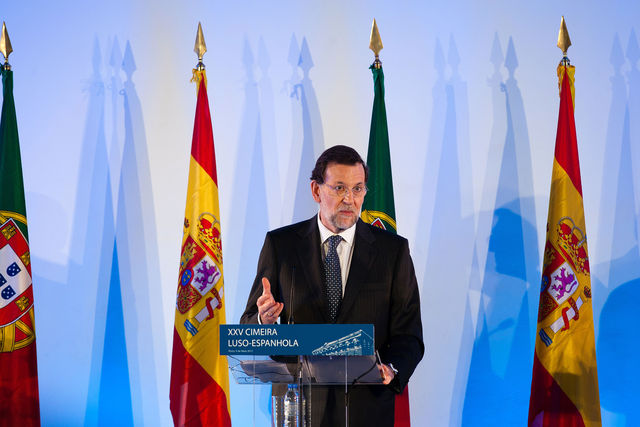 近日,西班牙首相拉霍伊(Rajoy)对国会表示,除非立法委员会支持他提出的削减赤字意见,否则西班牙将很有可能被迫退出金融市场。
近日,西班牙首相拉霍伊(Rajoy)对国会表示,除非立法委员会支持他提出的削减赤字意见,否则西班牙将很有可能被迫退出金融市场。
“当前,一个最严重的问题是,外界不愿借款给我国,即使借,也会开出天价的条件,”他在马德里对立法委这样说道。“当前,我们采取的一切行动都是为了使西班牙走出深渊。”
超额收益投资者要求持有西班牙的债务,而非德国债券扩大至欧元时代的最高纪录5.07个百分点。投资者都十分担忧银行的不良资产和希腊可能退出欧元区所带来的不良后果。
此外,西班牙基准收益率10年期国债上涨13个基点,达到6.48%。相比之下,3月初时还不达5%。那时,拉霍伊领导的人民党政府称2012年预算赤字目标将无法达标。
欧元区各国财长已经同意为西班牙树立一个新目标,即今年国内生产总值达到5.3%,而非2009年第二次大萧条时期的4.4%。去年同期的实际差值为8.5%,而当初定下的目标是6%。
作为交换条件,拉霍伊承诺明年计划将赤字削减为欧盟标准的3%。而他于2012年3月提交的预算报告也已表示,接下来30年,西班牙将采取紧缩的财政政策,提高税收、削减开支,以期节省270亿欧元(约合340亿美元)的国家资金。
Spain faces being shut out of financial markets unless lawmakers back his proposed deficit cuts, Prime Minister Mariano Rajoy told Parliament today.
“There is a serious risk that they don’t lend to us or that they lend to us at astronomical prices,” he told lawmakers in Madrid. “All the measures we are currently taking are to lift us out of a pit.”
The extra yield investors demand to hold Spanish debt instead of German bonds widened to a euro-era record of 5.07 percentage points amid investors’ concern about banks’ bad assets and a possible Greek exit of the euro area.
The yield on Spain’s benchmark 10-year bond rose 13 basis points to 6.48 percent, compared with less than 5 percent early March, before Rajoy’s People’s Party government said the country will miss its 2012 budget deficit target.
Euro finance ministers have since agreed to a new goal for Spain this year, at 5.3 percent of gross domestic product instead of 4.4 percent, as the nation faces its second recession since 2009. The shortfall last year was 8.5 percent, compared with a 6 percent target.
In exchange, Rajoy has pledged to cut the deficit to the EU limit of 3 percent next year, as initially planned. His 2012 budget presented in March included the deepest austerity measures in more than three decades, raising taxes and reducing spending to save around 27 billion euros ($34 billion).
![]() 近日,西班牙首相拉霍伊(Rajoy)对国会表示,除非立法委员会支持他提出的削减赤字意见,否则西班牙将很有可能被迫退出金融市场。
近日,西班牙首相拉霍伊(Rajoy)对国会表示,除非立法委员会支持他提出的削减赤字意见,否则西班牙将很有可能被迫退出金融市场。
